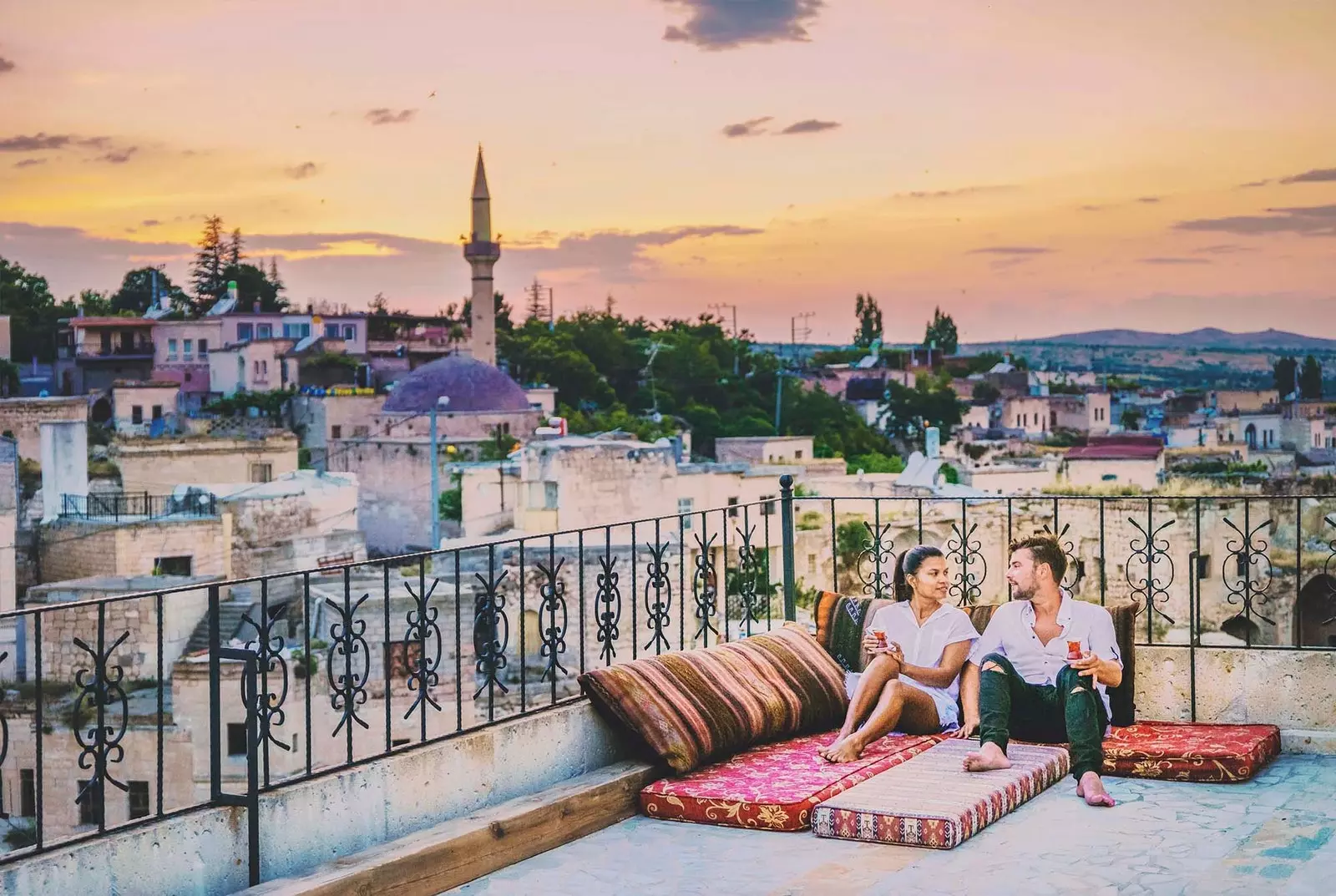
'Ubuntu' rules happiness in South Africa
We all know the ** hygge **, that feeling of warmth and well-being that the Danes have as a flag; the kalsarikanni , the Finnish penchant for stripping and drinking at home; the Swedish ** lagom **, which makes a virtue of the midpoint; the miracle of Bhutan , a country governed by Gross Domestic Happiness, and to the ikigai Japanese, which manages to give you a purpose in life, making it much more enjoyable.
But what about the rest of the world? What leads to joy in India? And in Syria? What makes the Turks happy? And the Russians? Where does ubuntu come from, that South African expression that Mandela always repeated? From the hand of Helen Russell and her Atlas of Happiness (Cúpula Books, 2018), we take a walk around the planet discovering that What makes people happy in countries we don't often hear about? … and how that question configures its national character.
INDIA: PLAY
The jugaad is a colloquial Hindi term that owes its name to the trucks that were improvised with parts from old military SUVs discarded in the 1950s. This word represents a markedly Indian philosophy, which represents inventiveness and encourages making the most of everything you have.
He exemplifies it in the book Fatema, which, until his youth, lived with eleven relatives under the same roof. “Although living this way brought us a lot of happiness, the small size of the space forced us to play the game,” he recalls. Thus, the lack of a room of his own in which to hang posters during his adolescence was resolved by his mother giving him the inside of a closet. “It was my space,” she recalls happily.
Gambling, in short, means finding a quick solution of whatever kind to reach your goal, instead of letting things happen and waiting for the ideal situation to happen. Of course, it is desirable to play the game from a stable position, rather than out of necessity, as is the case in much of India. “If you have all the basics, the game can help you climb to the top of Maslow's pyramid ”, Fatema states in the book.

Don't wait for the ideal situation: be happy now
RUSSIA: AZART
Azart, which comes from the French hasard -chance- means vehemence, fervor, ardor. It is associated, in turn, with recklessness and risk and, although it has nothing to do with happiness as we know it - after all, Moscow was voted in Travel + Leisure magazine as the most unfriendly city in the world. world-yes it is a celebration of enthusiasm and passion.
It is used to describe the feeling of when you're playing and you can't stop , when you are on the crest of the emotional wave (...) But it is also very important for happiness in Russia. We are a very sensitive people and we base many of our decisions on our emotions: with our eyes closed, in full wave of passion”, Ksenia, a native of the place, tells the author.
"Russia is a difficult country, so we have created our own ways of enjoying life," summarizes the interviewee. In fact, recalling both the rigors of the climate and the country's turbulent history, Russell writes: "This particular Russian idea of happiness comes not from cultivating a calm, satisfied, and constant feeling of happiness, but from hold on to fleeting moments of happiness with both hands ”.
The Russian idea of happiness goes even a little further, and seems to require a bit of suffering to make it especially intense, as occurs in the banya , the national sauna. In it you eat, you drink, you talk about profound topics - small talk practically does not exist in the country - or you hold work meetings at 100 degrees Celsius, and then you hit yourself with birch branches and walk out. to the snow to cool off. The result?: Pure happiness.

In Russia, intensity is valued more than tranquility
SYRIA: TARAB
Tarab refers to the music-induced emotional ecstasy , and is associated with traditional compositions written for the ud, a type of lute. "When the homeland of your youth is gone and you don't know when you'll see it again, it's nice to be able to watch videos of Syrian things on YouTube, like tarab music," Russell Madian, one of the thousands of Syrians displaced by the war, tells war.
“When we listen to tarab music we feel as if we were in another life, as if we were intoxicated with music”, he adds. "It's most special." To achieve such an effect, you have to listen carefully and for a while. After all, tarab songs don't last five minutes... but 30, 40, or even an hour. "It's music that makes you travel."
Science agrees with Madian, and confirms that, in addition to identity and enjoyment, music can lengthen our lives : In fact, in a study cited by the author, it was observed that mice given Verdi's La Traviata during the recovery process after a heart transplant lived almost four times longer than their counterparts, they didn't hear anything. “Tarab is essentially life support,” Russell concludes.
Many other studies also support the notion that enjoying live music improves everything from our stress levels to our emotional well-being. Madian, in fact, used to go to concerts in her city very often: “It was the most normal thing in the world, she says, and when you get used to having something every day, you take it for granted. And then one day, it disappears. And then, you feel that a part of you has also disappeared”, collects the writer. So you already know: incorporate concerts into your routine , even if you can't go see Umm Kulthum , considered by many to be the best tarab performer in the world.
TURKEY: KEYIF
Keyif is used to talk about a state of pleasant relaxation : The pursuit of calm joy is a national pastime, and therein lies, for many Turks, the very definition of happiness. We are talking about starting a game of backgammon and delaying it as long as the game demands, without ever looking at the clock; of meeting someone and wandering slowly and aimlessly - it's called gezme keyfi-, of having a barbecue anywhere surrounded by friends and family -mangal keyfi- and not finishing enjoying until dawn.
Everything can be keyif one knows how to disconnect and relax, how to be present in the moment. In fact, the best compliment that can be given to someone is “keyfine düşkün bir insan”, by which you are referring to the fact that this person is someone who give priority to pleasure.
Of course, one should not try too hard to get the keyif state or it would never reach it. Thus, if a host gets too serious about the decor or the food, the keyif may slip away. “That happens because the keyif has nothing to do with the appearance of things ”, explains Russell Olivia, from Istanbul, “but with comfort and peace of mind. All you have to do is… be calm.”
It is more than clear: relaxing is a highly appreciated activity in Turkey: "If someone has to work, we say kolay gelsin, which means 'make it easy for you'" -explains Melis, another interviewee. "We say it all the time: You can tell someone in the office in the morning, or you can walk past some construction workers on the street and tell them." You can even hear it in the gym! “For the Turks, relaxing the body and mind in the purest keyif style is an art form absolutely nothing to scoff at and certainly should never be rushed," Russell concludes.

To enjoy the 'keyif', forget the rush
SOUTH AFRICA: UBUNTU
Ubuntu comes from the Bantu languages and is formed by -ntv, which means "human being", and by ubu-, a prefix with which "humanity" is formed. Taken together, it means: I find my worth in you and you find your worth in me ”, and alludes to a feeling of interconnectedness and belief in a universal bond.
For Archbishop Desmond Tutu, ubuntu was the concept that guided his work as chairman of the Truth and Reconciliation Commission in post-apartheid South Africa. He explained it like this: “ Ubuntu is the essence of being a person . It means that we are a person through other people. We cannot be fully human alone. We are made to be interdependent, we are made to be family. Because my humanity is interwoven with your humanity, and when your humanity is enhanced, so is mine. In the same way, when you are dehumanized, inexorably, so am I ”.
Russell picks up that Nelson Mandela During the 27 years he spent in prison, he had more reasons than most of us to be pissed off at the world and to have little desire to take on the pain or problems of others. But, thanks to ubuntu, for Mandela, that was never an option. In fact, he himself explained the term by recalling how, when he was young, any traveler crossing the country was offered food and water as soon as he stopped in a town, without even having to ask for it.
Today, however, due to inequality still widespread in the country and the wheel of capitalism, which never stops and constantly makes us want more, ubuntu could be threatened. But it still lives on in the hearts of South Africans like Vusi, interviewed by Russell: "It's probably the most important principle i follow in my life ”.
